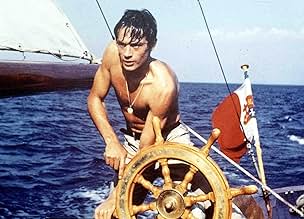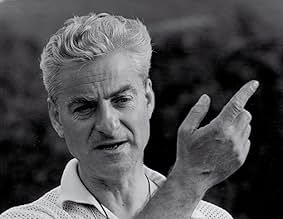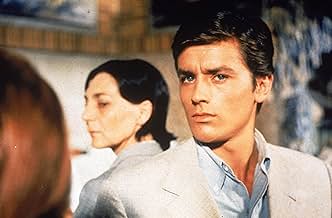Tom Ripley is a talented mimic, moocher, forger and all-around criminal improviser; but there's more to Tom Ripley than even he can guess.Tom Ripley is a talented mimic, moocher, forger and all-around criminal improviser; but there's more to Tom Ripley than even he can guess.Tom Ripley is a talented mimic, moocher, forger and all-around criminal improviser; but there's more to Tom Ripley than even he can guess.
- Director
- Writers
- Stars
- Awards
- 1 win total
Marie Laforêt
- Marge Duval
- (as Marie Laforet)
Billy Kearns
- Freddy Miles
- (as Bill Kearns)
René Clément
- Le serveur maladroit
- (uncredited)
Walter Grant
- Bit
- (uncredited)
Paul Muller
- Blind Man
- (uncredited)
Jacqueline Parey
- Ingrid
- (uncredited)
Romy Schneider
- Freddy's companion
- (uncredited)
- Director
- Writers
- All cast & crew
- Production, box office & more at IMDbPro
7.723.3K
1
2
3
4
5
6
7
8
9
10
Featured reviews
The Riveting Mr. Ripley
I saw Minghella's "The Talented Mr. Ripley" and Clement's "Purple Noon" back to back. Two entirely different movies based on exactly the same book. The differences are personal of course. Minghella has a moralistic view of his characters and their darkness must be, somehow, explained if not justified. Clement's allows the amorality of his characters to run loose. Minghella casts Matt Damon as Tom Ripley, a rather invisible actor in every way and although he's pretty good here, he's not good enough to overshadow his rival: Jude Law. Clement casts Alain Delon as Ripley and you will be with him all the way, you'll go where he goes you will turn out to be as amoral as he is - at least I did, I just wanted him to get away with it and why? Because he was Alain Delon, the Tom Ripley that, clearly, Patricia Highsmith intended. His rival is Maurice Ronet, good as he is, I didn't miss him when he left. You know why? Because I was left with the dangerous, magnetic, amoral, riveting Alain Delon. Clement allows us to see the difficulty and danger of the murders, we see them, we are there. Minghella plays it rather hurriedly. There is no real tension or horror. The most suspenseful moment is at an Opera house. The pluses on "The Talented Mr Ripley" - besides the aforementioned Jude Law - are Gwyneth Paltrow and Cate Blanchett in two beautifully written and performed parts. In "Purple Noon" Marie Laforet is left rather to her own devices. Once all said and done you can watch both films as if they weren't even related. I prefer "Purple Noon" but that's just me.
Terrific version of the Patricia Highsmith novel
Extremely well done, tightly edited, well acted (by everyone, including the small roles, especially the actor who has to appear dead with long camera shots in a tense scene in the hotel). Delon is perfectly cast, with his calculating cool.
The cinematography is gorgeous, especially the scenes on the yacht---nothing gimmicky, but shot with an expertise that gives true drama to the action. You can feel the waves, the wind, and the sun. The colors are vibrant on the DVD. Though a scene like this in a typical movie today would include a heavy ominous score, the director simply lets the sound of the wind create the tension. The score (by Nina Rota), in fact, is understated, unlike anything today. Even the opening credits have style.
The cinematography is gorgeous, especially the scenes on the yacht---nothing gimmicky, but shot with an expertise that gives true drama to the action. You can feel the waves, the wind, and the sun. The colors are vibrant on the DVD. Though a scene like this in a typical movie today would include a heavy ominous score, the director simply lets the sound of the wind create the tension. The score (by Nina Rota), in fact, is understated, unlike anything today. Even the opening credits have style.
Chilling Original of The Talented Mister Ripley
Purple Noon with Alain Delon, Maurice Ronet,and Marie Laforêt, is the chilling original to The Talented Mister Ripley. The blindingly beautiful Mediterranean background serves as a stark contrast to the lives of three spoiled and amoral characters on holiday in Italy. This original of The Talented Mr. Ripley is far different from the more recent movie, with Delon being more believable as Tom Ripley, his unbelievably handsome face hiding an evil mind, willing to do whatever it takes to trade places with Philippe Greenleaf.
There are some gratuitous shots here for 1960, and I wasn't real impressed with Maurice Ronet,who seemed too old for the part of Philippe, but on the whole, an enjoyable experience with great plot development and cinematography. The movie pulled you in like a day in the Riviera.
There are some gratuitous shots here for 1960, and I wasn't real impressed with Maurice Ronet,who seemed too old for the part of Philippe, but on the whole, an enjoyable experience with great plot development and cinematography. The movie pulled you in like a day in the Riviera.
Clément's camera is always in some unexpected place that enhances the drama and tightens the suspense; Alain Delon makes an excellent Tom Ripley
I'm fascinated by a scene at a restaurant. We get an extreme close-up of a woman who is kept out of focus while another character in the background, who is speaking and is in the center of the shot, remains in focus. Is the woman who is out of focus important or not? More to the point, was shooting it this way a good idea? It illustrates by contrast how sure-footed René Clément is most of the time. Usually there can be no debate.
I wasn't familiar with Clément's work until this film, but my God, he's good. His camera is always in some unexpected place that enhances the drama and tightens the suspense. He shares that talent with Orson Welles (meaning the Welles of "Citizen Kane" and "The Magnificent Ambersons," not, say, "Lady from Shanghai"), who also made decisions that are surprising yet invariably right.
Tom Ripley (Alain Delon) and Phillipe Greenleaf (Maurice Ronet) are lately inseparable friends. They're both idling in Europe, but on papa Greenleaf's dime. Phillipe's fiancée Marge (Marie Laforêt) feels sorry for Tom but resents his presence. Phillipe's other friend, Freddie (Billy Kearns), considers Tom Ripley a worthless moocher. But there's more to Tom Ripley, the mimic, the forger, the talented criminal improviser, than anyone, even Tom Ripley himself, can guess.
Alain Delon, with his chiseled looks and cold beauty, makes an excellent Tom Ripley. The script is brilliantly adapted from Patricia Highsmith's terrific suspense novel, "The Talented Mr. Ripley": the dialogue is always bringing the themes of duplicity, love, self-love, the nature of identity, ruthlessness and murder to the surface where they are given a brilliant sheen by Clément and his cinematographer Henri Decaë.
We're left to figure things out for ourselves, which is rare. Do we need to be told what Tom thinks of when he sees all those dead fish? When a door with a mirror swings open toward Tom, do we need to see Tom's mirror image to understand the mirror's significance? Or is it enough that we know there's a mirror next to Tom? I know what the answers would have been in Hollywood—in 1960 and now. Here, the answers are no, no and yes.
I wasn't familiar with Clément's work until this film, but my God, he's good. His camera is always in some unexpected place that enhances the drama and tightens the suspense. He shares that talent with Orson Welles (meaning the Welles of "Citizen Kane" and "The Magnificent Ambersons," not, say, "Lady from Shanghai"), who also made decisions that are surprising yet invariably right.
Tom Ripley (Alain Delon) and Phillipe Greenleaf (Maurice Ronet) are lately inseparable friends. They're both idling in Europe, but on papa Greenleaf's dime. Phillipe's fiancée Marge (Marie Laforêt) feels sorry for Tom but resents his presence. Phillipe's other friend, Freddie (Billy Kearns), considers Tom Ripley a worthless moocher. But there's more to Tom Ripley, the mimic, the forger, the talented criminal improviser, than anyone, even Tom Ripley himself, can guess.
Alain Delon, with his chiseled looks and cold beauty, makes an excellent Tom Ripley. The script is brilliantly adapted from Patricia Highsmith's terrific suspense novel, "The Talented Mr. Ripley": the dialogue is always bringing the themes of duplicity, love, self-love, the nature of identity, ruthlessness and murder to the surface where they are given a brilliant sheen by Clément and his cinematographer Henri Decaë.
We're left to figure things out for ourselves, which is rare. Do we need to be told what Tom thinks of when he sees all those dead fish? When a door with a mirror swings open toward Tom, do we need to see Tom's mirror image to understand the mirror's significance? Or is it enough that we know there's a mirror next to Tom? I know what the answers would have been in Hollywood—in 1960 and now. Here, the answers are no, no and yes.
Adventures In Paradise
Visually, this film could serve as a cinematic poster for a Mediterranean cruise. Cinematographer Henri Decae draws us into the film with its alluring Italian locales and gorgeous panoramic vistas. Bright, complementary hues and high color contrast translate into eye-popping reds and yellows. And, of course, there's the deep blue color of the sea, and a brilliant sunlit sky. Such is the setting for a story wherein three attractive, young adults (Tom, Philippe, and Marge) test a 3-way relationship that is far more complex than it first appears.
Indeed, trouble lurks beneath the surface (so to speak), in this "Italiano paradiso" thriller. In the first forty minutes, the psychological motivations of our three beautiful people are unclear and subject to change. It's hard to tell who is doing what to whom. Subsequent to this narrative setup, we see exactly where the story is headed. Because "Plein Soleil" is a psychodrama, casting is important. The three leads (Alain Delon, Maurice Ronet, and Marie Laforet) are all convincing in their roles.
I have not read the Highsmith novel on which the screenplay was based. So I cannot make an intertextual analysis. I do think this 1960 film is superior, for various reasons, to the more recent remake.
Adroitly directed by Rene Clement, with a buoyant musical score by Nino Rota, "Plein Soleil" is a character study of an amoral pleasure seeker whose charming personality masks the evil within. The juxtaposition of inwardly criminal intent with outwardly idyllic scenes of Italy and the Mediterranean results is an art house film that is both picturesque and suspenseful. It's a film that appeals both to our eyes and to our brains.
Indeed, trouble lurks beneath the surface (so to speak), in this "Italiano paradiso" thriller. In the first forty minutes, the psychological motivations of our three beautiful people are unclear and subject to change. It's hard to tell who is doing what to whom. Subsequent to this narrative setup, we see exactly where the story is headed. Because "Plein Soleil" is a psychodrama, casting is important. The three leads (Alain Delon, Maurice Ronet, and Marie Laforet) are all convincing in their roles.
I have not read the Highsmith novel on which the screenplay was based. So I cannot make an intertextual analysis. I do think this 1960 film is superior, for various reasons, to the more recent remake.
Adroitly directed by Rene Clement, with a buoyant musical score by Nino Rota, "Plein Soleil" is a character study of an amoral pleasure seeker whose charming personality masks the evil within. The juxtaposition of inwardly criminal intent with outwardly idyllic scenes of Italy and the Mediterranean results is an art house film that is both picturesque and suspenseful. It's a film that appeals both to our eyes and to our brains.
Alain Delon's Top 10 Films, Ranked
Alain Delon's Top 10 Films, Ranked
To celebrate the life and career of Alain Delon, the actor often credited with starring in some of the greatest European films of the 1960s and '70s, we rounded up his top 10 movies, ranked by IMDb fan ratings.
Did you know
- TriviaAlain Delon's then girlfriend Romy Schneider appears in the very first scene as a friend of Freddie Miles.
- GoofsOnlookers are clearly visible in the background in the fish market scene.
- Quotes
Philippe Greenleaf: That's why you took my bank statements?
Tom Ripley: Exactly.
Philippe Greenleaf: So you kill me and you're rich?
Tom Ripley: Don't miss a trick, do you?
Philippe Greenleaf: It seems awfully complicated. You'd be caught immediately.
Tom Ripley: No necessarily. I might not look it, but I've got lots of imagination.
- ConnectionsEdited into Catalogue of Ships (2008)
- How long is Purple Noon?Powered by Alexa
Details
Box office
- Gross worldwide
- $234,728
- Runtime
- 1h 58m(118 min)
- Aspect ratio
- 1.66 : 1
Contribute to this page
Suggest an edit or add missing content

![Watch Trailer [English SUB]](https://m.media-amazon.com/images/M/MV5BYzkzMWVkMmEtM2I3Zi00MjE2LTkxZGYtZDYxMDFmMjBmMzM5XkEyXkFqcGdeQXRyYW5zY29kZS13b3JrZmxvdw@@._V1_QL75_UX500_CR0)



































